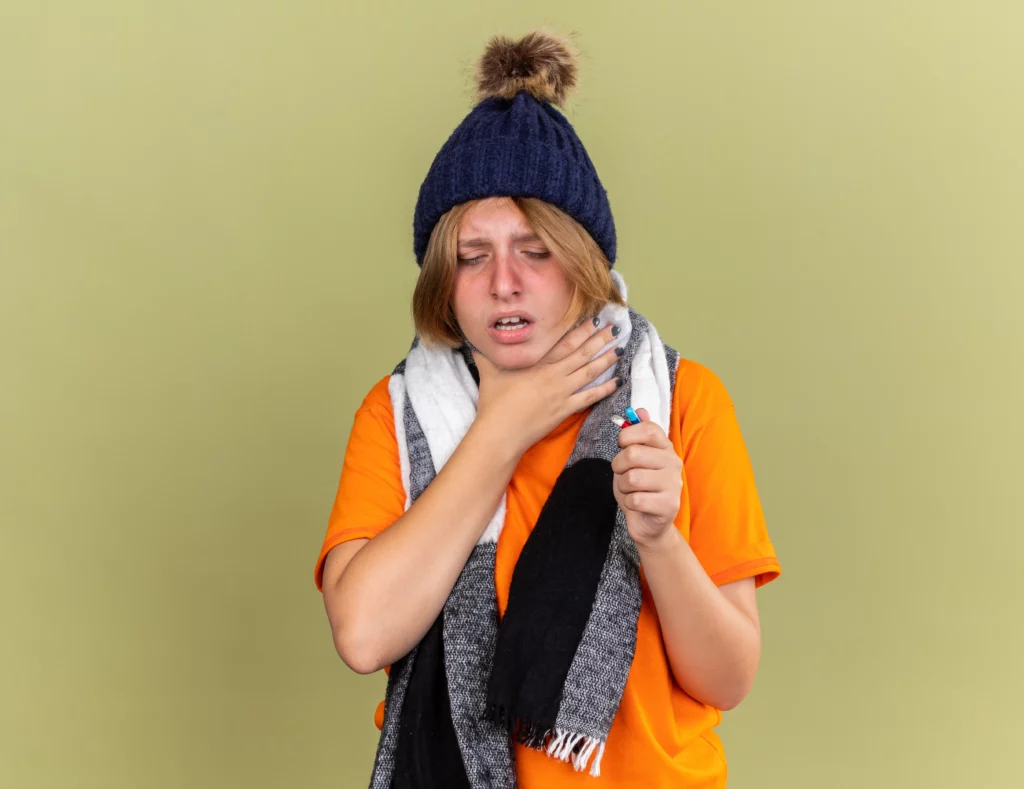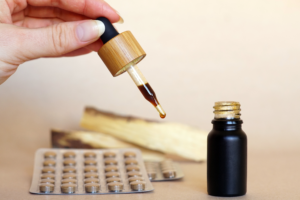Overview
Strep throat is more than just a painful nuisance—it’s a bacterial infection that can knock you off your feet if left untreated. Ever wondered how long does strep throat last without antibiotics? Brace yourself because it can stick around for 7 to 10 days, making every swallow feel like a chore. But here’s the kicker: if you don’t treat it, it’s not just the sore throat that overstays its welcome; complications like rheumatic fever could also lurk around the corner. On the bright side, with antibiotics for sore throat caused by strep, you could feel much better in just 24 to 48 hours. If you’ve been toughing it out and asking yourself, can strep throat clear on its own?—yes, it might, but why take the risk? While strep throat self-care, like sipping warm teas and resting, can offer some relief, they’re not a cure. So, how long can strep throat last without the proper treatment? A lot longer than you’d want, and with way more risk. Understanding how long does a sore throat last with and without antibiotics could be the key to getting back on your feet faster, healthier, and with peace of mind.
How long do strep symptoms last?
Strep throat is a common bacterial infection that typically starts with a sudden, painful sore throat and can come with symptoms like fever, headache, and swollen lymph nodes. But how long do strep symptoms last? Without treatment, the symptoms can persist for about 7 to 10 days. However, this can vary depending on individual immune responses and the severity of the infection.
If you’re wondering how long it takes for strep throat to go away with antibiotics, the answer is usually within 24 to 48 hours after starting treatment, with most symptoms significantly improving or disappearing entirely. But will strep go away on its own? In some cases, the body might eventually fight off the infection, but this can take longer, and there’s a higher risk of complications like rheumatic fever or kidney issues. Therefore, while strep throat might clear up on its own, it’s not worth the risk of leaving it untreated.
Early medical intervention shortens the duration of symptoms and reduces the chance of spreading the infection to others. So, knowing how long strep symptoms last and the importance of prompt cure can significantly affect your recovery and overall health.
Strep Throat Symptom Checker
Do you have symptoms of strep throat? Use our checker to understand your condition and know when to seek medical help.
Severe Sore Throat, Fever, and Difficulty Swallowing: Do you experience these symptoms?
These symptoms are typical signs of strep throat. Left untreated, strep throat can lead to complications like rheumatic fever or kidney issues.
Early intervention with Antibiotics can alleviate symptoms within 24-48 hours and reduce the risk of complications.
Get Antibiotics NowHeadache, Fatigue, and Swollen Lymph Nodes: Are you experiencing these symptoms?
These signs could indicate strep throat or another bacterial infection. Prolonged symptoms without treatment may lead to complications affecting your heart or kidneys.
Consult a healthcare provider and start antibiotic therapy to prevent severe outcomes and speed up recovery.
Consult a Doctor NowRash and Fever Following Sore Throat: Do you have these symptoms?
A rash with a sore throat could be a sign of scarlet fever, a complication of untreated strep throat.
Immediate medical attention is necessary. Antibiotics can help resolve symptoms and prevent the condition from worsening.
Get Azithromycin NowWill it resolve by itself?
Some people hope strep throat will resolve, but this approach can be risky. When the body tries to fight off a strep throat infection without antibiotics, the immune system naturally works to eliminate the bacteria (Streptococcus pyogenes) that cause the infection. While this can sometimes be effective, it is risky for several reasons, especially because of potential complications like rheumatic fever and kidney issues (post-streptococcal glomerulonephritis). So, can strep go away on its own? Yes, but the process is slow, and the symptoms, such as a painful sore throat, can last for 7 to 10 days or longer.
Knowing when strep throat goes away is crucial. Antibiotics typically improve symptoms within 24 to 48 hours, making them the best course for a faster and safer recovery.
“While the body might eventually fight off a strep infection, the risks outweigh the benefits. Prolonged symptoms not only make recovery more uncomfortable but also increase the chances of serious complications like rheumatic fever and kidney damage. These conditions can have long-lasting, sometimes permanent, effects on a person’s health. Antibiotics shorten the illness and reduce discomfort. They also play a crucial role in preventing these severe complications.”
Complications of not treating strep throat include
Prolonged Symptoms:
- Strep throat symptoms, such as a severe sore throat, fever, and swollen lymph nodes, typically last longer without antibiotics. This is because antibiotics are specifically designed to target and kill the bacteria responsible for the infection, shortening the duration of symptoms.
- Without treatment, these symptoms may persist for 7-10 days or longer, during which the bacteria continue to thrive and may cause more severe symptoms over time.
Increased Risk of Complications:
If strep throat is left untreated, the body’s immune response can go into overdrive. This excessive immune activity can lead to serious complications:
Rheumatic Fever:
- Rheumatic fever is an inflammatory disease that can develop as a complication of untreated or improperly treated strep throat. It occurs when the immune system mistakenly attacks its own tissues, particularly the heart, joints, skin, and brain, due to molecular mimicry between the strep bacteria and human proteins.
- Heart Damage: One of the most concerning aspects of rheumatic fever is its potential to cause permanent damage to the heart (rheumatic heart disease), especially the valves, which can lead to lifelong heart problems.
- Joint Inflammation: Rheumatic fever can cause painful joint swelling (arthritis), typically starting in the knees, ankles, elbows, or wrists.
- Other Symptoms: It can also lead to skin rashes, fever, and uncontrolled body movements (Sydenham’s chorea).
- Rheumatic fever typically occurs 2-4 weeks after the initial strep throat infection.
Kidney Issues (Post-Streptococcal Glomerulonephritis):
- Post-streptococcal glomerulonephritis (PSGN) is a type of kidney inflammation that can occur after a strep infection. It results when the immune system forms immune complexes (antibody-antigen formations) in response to the strep bacteria. These complexes get trapped in the small blood vessels in the kidneys, leading to inflammation.
- Symptoms: PSGN can cause blood in the urine (hematuria), reduced urine output, swelling (edema) in the face, hands, or feet, high blood pressure, and fatigue.
- Long-Term Damage: While PSGN often resolves on its own in children, in rare cases, it can lead to permanent kidney damage or chronic kidney disease, particularly in adults.
Immune System Overreaction:
The body’s immune system may fight off the infection by producing antibodies that attack the strep bacteria. However, these antibodies can sometimes also attack the body’s tissues, particularly in the heart, joints, kidneys, and nervous system. This immune overreaction can lead to the aforementioned complications (rheumatic fever and kidney damage)
How long is strep contagious?
Strep throat is highly contagious, and understanding how long it remains is crucial for preventing its spread. How is strep throat spread? Close contact is a significant risk factor because the disease primarily spreads through respiratory droplets when an infected individual sneezes, coughs, or talks. Without treatment, an individual with strep throat can be contagious for up to 2 to 3 weeks, even if symptoms improve.
However, once antibiotic treatment begins, the contagious period significantly decreases. Typically, after 24 hours of taking antibiotics, the risk of spreading the infection drops dramatically, making it safer to interact with others.
This reduction in contagiousness underscores the importance of prompt treatment for quicker recovery and to protect those around you from catching the infection.
How long is strep contagious with antibiotics?
The contagious period is significantly reduced when strep throat is treated with antibiotics. Typically, after starting antibiotic treatment, a person is no longer contagious within 24 hours. This means that after a full day of taking antibiotics, the risk of spreading the infection to others is minimal. However, during the first 24 hours, limiting contact with others is crucial, so should I stay home if I have a sore throat? Especially if strep throat is suspected or confirmed. Staying home helps prevent the spread of the bacteria to others, especially in environments like schools or workplaces where close contact is common.
Antibiotics lower contagiousness quickly, but it’s crucial to finish the whole course of treatment to guarantee total eradication of the bodily infection and to avoid consequences or recurrence.
How to recover from strep throat?
Recovering from strep throat involves a combination of medical treatment, self-care practices, and lifestyle adjustments to ensure a full and speedy recovery. Here’s a detailed explanation of the methods that can help you recover from strep throat:
Antibiotic Treatment
Strep throat is a bacterial infection caused by Streptococcus pyogenes (Group A Streptococcus). The most effective treatment is antibiotics, usually penicillin or amoxicillin.
Antibiotics kill the bacteria causing the infection, reduce symptoms, and prevent complications such as rheumatic fever. Antibiotics also shorten the duration of the contagious period, typically making you no longer contagious within 24 hours of starting treatment.
Completing the entire course of antibiotics is crucial, even if you start feeling better before the medication is finished. Stopping antibiotics too early can lead to a recurrence of the infection or antibiotic resistance.
Rest and Hydration
Resting and staying hydrated are essential to recovering from any illness, including strep throat.
Your body can concentrate its energies on battling the virus while you sleep. Adequate sleep helps boost the immune system, making it more effective at combating the bacteria. Hydration is equally important, as fluids keep the throat moist, soothe irritation, and help prevent dehydration, which can be caused by fever or difficulty swallowing.
Resting and drinking plenty of fluids—such as water, herbal teas, and broths—can help ease symptoms and speed up recovery. Avoiding dehydrating beverages like caffeine and alcohol is also recommended.
Pain Relief and Fever Reduction
Over-the-counter painkillers (OTC), including acetaminophen or ibuprofen, can help treat strep throat symptoms and lower fever.
These drugs reduce inflammation and prevent the brain from producing chemicals that cause fever and pain. Managing pain and fever is important not only for comfort but also to help maintain energy levels and encourage rest, both of which are essential for recovery.
Throat Soothers
Soothing the throat can alleviate the pain and discomfort associated with strep throat.
Various methods can help soothe a sore throat, such as:
- Gargling with salt water: Mix 1/4 to 1/2 teaspoon of salt in an 8-ounce glass of warm water and gargle several times daily. This can help reduce swelling and irritation in the throat.
- Honey and lemon: Honey has mild antimicrobial effects, and adding it to warm water or tea can create a soothing coating for the throat.
- Lozenges and throat sprays: OTC throat lozenges or sprays that contain numbing agents like benzocaine can temporarily relieve throat pain.
Alleviating throat pain can make eating, drinking, and resting easier, contributing to faster recovery.
Humidify the Air
Adding moisture to the air using a humidifier might help reduce inflammation in the throat.
Dry air can irritate already sore throats and make them worse. A humidifier can help prevent uncomfortable and excessively dry throats by preserving the moisture in the air.
Maintaining a wet environment can help ease throat irritation and facilitate breathing, particularly in the winter when indoor air tends to be dry.
Dietary Considerations
Eating soft, soothing foods that are easy to swallow can help when your throat is sore.
Soft foods like soups, broths, mashed potatoes, yogurt, and smoothies are less likely to irritate a sore throat than hard, crunchy, or spicy foods. Ice cream and popsicles are cold foods that temporarily relieve sore throats by numbing them.
Proper nutrition is critical to supporting the immune system and promoting recovery, so even when swallowing is painful, it’s essential to maintain a balanced diet with foods that are easy on the throat.
Avoiding Irritants
Avoid things and activities that can aggravate symptoms by irritating the throat.
A sore throat can worsen due to irritants such as alcohol, cigarette smoke, dry or dirty air, and so on. In particular, smoking can impede recovery and raise the possibility of problems.
Reducing irritations facilitates a faster recovery by lessening inflammation and pain in the throat.
When to consult a doctor?
Knowing when to see a doctor is critical to your health and healing. Below are some key signs that it’s time to seek professional medical advice.
- If you have a sore throat that lasts longer than 48 hours and is accompanied by a fever.
- When you notice white patches or streaks of pus on your tonsils or in the back of your throat.
- If you experience difficulty swallowing or breathing, or if your throat pain is severe and not relieved by over-the-counter pain relievers.
- When you have swollen lymph nodes in your neck and a sore throat.
- If you or your child have been in contact with someone diagnosed with strep throat and you start showing symptoms.
- If, after beginning antibiotics, your symptoms do not get better within 24 to 48 hours or if they get worse.
- If you experience joint discomfort, breathing difficulties, or a rash could indicate problems resulting from untreated strep throat.
- If you frequently get sore throats or have recurrent episodes of strep throat, this could be a sign that you need more testing.
FAQs about how long does strep throat last
The fastest way to treat strep throat is by taking prescribed antibiotics, which typically start working within 24 to 48 hours. Alongside antibiotics, resting, staying hydrated, and using over-the-counter pain relievers can help speed up recovery and relieve symptoms.
Yes, hot showers can be beneficial for strep throat. The steam from a hot shower helps to soothe a sore throat by keeping it moist and ease congestion if you have other cold-like symptoms. Additionally, the warmth may help relax your muscles and reduce overall discomfort. While it won’t cure the infection, it can provide temporary relief from some of the symptoms.
Yes, ibuprofen helps treat strep throat by lowering fever, discomfort, and inflammation brought on by the illness. It prevents the body from producing specific molecules that lead to pain and inflammation. Taking the recommended antibiotics is crucial if strep throat is detected because ibuprofen treats only the symptoms, not the bacterial infection causing them.
Yes, an “AZ pack” (azithromycin) can be used to treat strep throat, especially for those allergic to penicillin. Azithromycin is an antibiotic that helps eliminate the bacteria causing the infection. Finishing the AZ pack is crucial to eliminating the disease and avoiding consequences.
After starting strep throat antibiotics, most people feel better within 24 to 48 hours. Symptoms like sore throat, fever, and fatigue typically improve during this time. However, it’s essential to complete the entire course of antibiotics to ensure the infection is fully treated and to prevent complications, even if you feel better quickly.







